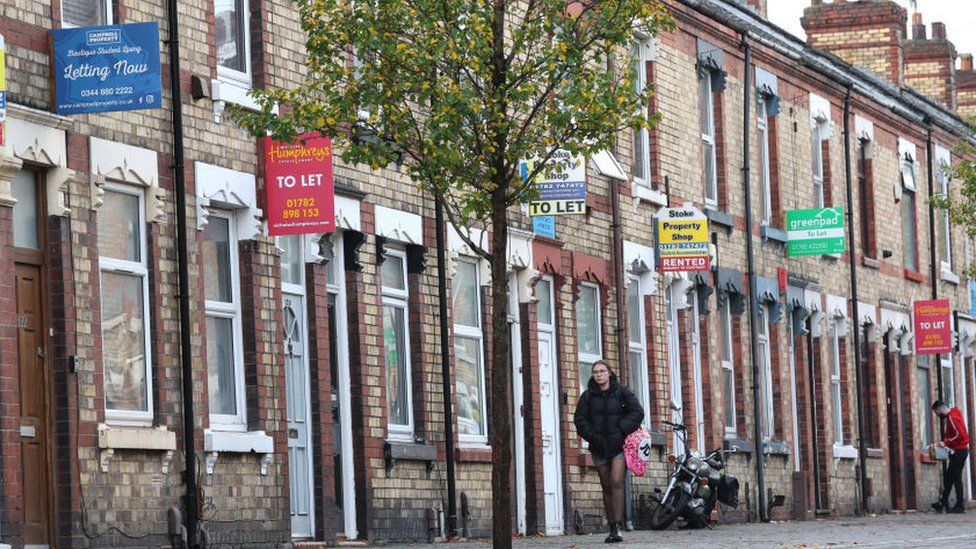Renters Reform Bill: Warning changes could ‘decimate’ student market

Plans to abolish fixed-term tenancies in England would “decimate” the student housing market, landlords have warned.
The National Residential Landlords Association (NRLA) said a lack of certainty properties would be available at the start of the academic year could cause “chaos”.
But the National Union of Students said if students were exempt from reforms they would become an “underclass”.
The government said it was engaging with students and landlords.
Landlords renting to students typically offer a 12 month fixed-term contract to match the academic year and ensure properties are not left empty outside term-time.
However, under the Renters (Reform) Bill, which was introduced to Parliament last week, fixed-term tenancies will be abolished and replaced with rolling tenancies, which means tenants pay rent weekly or monthly with no fixed end date.
The changes mean tenants will only need to provide two months’ notice to leave a property.
The bill, which applies to England, also scraps so-called “no-fault evictions”, with landlords only able to evict tenants in certain circumstances, including when they wish to sell the property or when they or a close family member want to move in.
Purpose-Built Student Accommodation, which is built specifically for students, will be exempt from these changes but other student housing will not.
According to the Daily Telegraph, the government is looking at making changes to the bill to make it easier for landlords to let out their properties to students on a yearly basis.
The NRLA said under current proposals, landlords would be reliant on sitting tenants giving notice to leave a property in good time to enable new students to move in.
The group’s policy director, Chris Norris, said the government should add a provision allowing student landlords to end a tenancy in line with the academic year.
- ‘Renting reforms have come too late for me and my kids’
- What are your rights when you’re renting?
Sarah Black, who rents four properties in Bath to students, said she was “extremely worried” about plans to get rid of fixed-term tenancies.
She told the BBC the proposals would lead to “chaos” as landlords would not be able to guarantee their properties would be available the following academic year.
Ms Black said she would normally rent to a group of friends for a 12-month period but under the planned changes if one tenant decided to stay on in the property, this could block another group from moving in.
She added that if a tenant chose to move out early a room could be empty for several months until the start of the next academic year, leading to a loss of income.
Ms Black said that if issues with the bill were not resolved she would consider selling her properties.
“The more landlords that leave, the more that the supply, which is already very, very tight, is going to go down,” she said, adding that this would lead to increased prices for students.
“A lot of landlords won’t be able to take the risk. They won’t be able to have voids or rooms which are not let halfway through the year.”

Labour MP Clive Betts, who chairs the Commons Housing Committee, said if more landlords left the student rental sector this would make existing shortages of student housing worse.
He argued all student housing should be exempt from the changes to fixed-term tenancies.
“I think [this issue] will certainly be challenged when it comes into debate in Parliament,” he added.
The bill has not yet been debated by MPs and peers, and changes could be introduced before it becomes law.
Universities UK, which represents the sector, has also raised concerns that abolishing fixed-term tenancies for student housing could undermine the stability of the sector and reduce the amount of accommodation available.
In Scotland, where fixed-term tenancies were scrapped in 2017, research commissioned by the Scottish government last year found new tenancy rules had contributed to landlords leaving the student rental market and renting to longer-term tenants instead.
However, the National Union of Students said exempting students from rental reforms would create an “underclass of tenants”, who would not benefit from the same safeguards as other renters.
The union added that under the current system of fixed-term tenancies students were forced to pay for rooms they were not using over the summer months, or if they left their courses early.
Dan Wilson Craw, acting director of campaign group Generation Rent, said treating students differently from other renters could encourage “unscrupulous landlords to target that sector and take advantage of looser rules”.
“Part of the reason the government is scrapping fixed terms for the private sector is to give tenants a little bit more flexibility if the home that they move into turns out not to be suitable,” he said.
“So if you’re signed into a tenancy for a property that’s falling apart, if you’re unable to get your landlord to make the repairs that are needed, then in a lot of cases moving out would be an option.”
A Department for Levelling Up, Housing and Communities spokesman said: “The vast majority of students move out at the end of the academic year and will not be impacted by these reforms.
“However, we continue to engage with students and landlords on these measures to ensure they are working for both parties.”
Related Topics
- Housing
- Renting
- Students
- Landlords
-
No-fault evictions to be banned in renting reforms
-
17 May

-
-
‘Renting reforms have come too late for me and my kids’
-
17 May

-
-
What are your rights when you’re renting?
-
17 May

-
-
Rent prices: Have they gone up in your area?
-
29 March

-
Published at Wed, 24 May 2023 23:00:57 +0000
